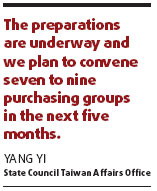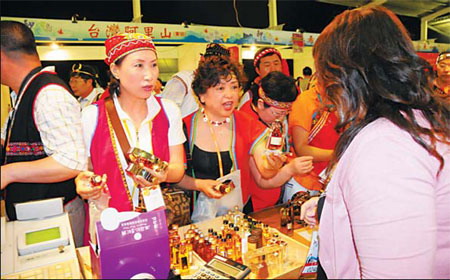A historic meeting between leaders of the Communist Party of China (CPC) and the Kuomintang (KMT) in May last year ushered in a new era of cooperation between the two sides.

"A series of major achievements have been made in relations across the Taiwan Straits since that meeting, opening the prospect for peaceful development of cross-Straits relations," said General Secretary of the CPC Central Committee Hu Jintao when he met with KMT Chairman Wu Poh-hsiung at a second meeting in Beijing last month.
On May 28, 2008, Hu and Wu met at the Great Hall of the People in Beijing. It was the first meeting between leaders of the two parties after the Democratic Progressive Party was routed by the KMT in the Taiwan polls two months earlier.
During that meeting, Hu called for the resumption of exchanges and talks between the mainland's Association for Relations Across the Taiwan Straits (ARATS) and Taiwan's Strait Exchange Foundation (SEF). Hu said talks should be based on the 1992 Consensus, in which "both sides of the (Taiwan) Straits adhere to the 'one-China' principle".
During the meeting on May 26 this year, Hu and Wu reviewed the significant progress and achievements made since that meeting and discussed ways to push forward the peaceful development of cross-Straits relations.
Analysts in Beijing said the improvement in cross-Straits ties represents the aspirations of the people and that communication and cooperation had also brought substantial benefits.
With the 1992 Consensus and opposing "Taiwan independence" serving as common ground, the two sides seized a rare opportunity, adopted active measures and carried out positive interactions.
 |
|
Amway (China) sales representatives buy souvenirs in Taichung in Taiwan on May 14, at the conclusion of a two-month program in which 12,000 Amway employees visited the island. [Xinhua]
|
In the spirit of building trust, laying aside disputes, seeking consensus and shelving differences, and creating a win-win situation, the two sides found ways to expand communication and cooperation, promote negotiations and handle problems.
The two sides made clear the goals of peaceful development of cross-Straits relations, and maximized their efforts to win the understanding, support and joint efforts of all social sectors across the Taiwan Straits.
To improve cross-Straits relations, the Chinese mainland and Taiwan also agreed to address easy issues first and leave difficult problems for later on.
The peaceful development of cross-Straits relations over the last 12 months has created conditions for both sides to upgrade their interaction.
ARATS and SEF, two organizations authorized by the Chinese mainland and Taiwan to handle cross-Straits issues, held three rounds of talks in June 2008, November 2008 and April 2009.
During the first two talks, the two signed agreements on weekend charter flights, tourism, direct shipping, air transport, postal services and food safety. In their latest round of talks held in Nanjing from April 25-26, they focused on regular cross-Straits flights, joint efforts on cracking down on crime, and financial cooperation.
On Dec 15, 2008, the mainland and Taiwan started direct air and sea transport and postal services amid warming ties, ending decades of practice that air and sea movements - including mail - traveled via a third location, usually Hong Kong or Macao.
In addition, tourism to Taiwan has increased in the past year. As of May 15, more than 300,000 mainland tourists had traveled to the island and the figure is expected to surpass 600,000 this year.
On Dec 31 last year, Hu made six proposals to promote the peaceful development of the cross-Straits relationship in a speech to commemorate the 30th anniversary of the mainland's "Message to Compatriots in Taiwan".
Hu said the mainland is willing to discuss with Taiwan proper and reasonable arrangements for Taiwan's pasrticipation in activities of international organizations, as long as this does not create a scenario of "two Chinas" or "one China, one Taiwan".
In May, China's State Council announced a plan to support the development of an economic zone on the western side of the Taiwan Straits. The plan is aimed at boosting development in a region led by Fujian province and promoting cooperation between the region and Taiwan.
During the Straits Forum in the coastal city of Xiamen in May, Wang Yi, minister of the State Council Taiwan Affairs Office, announced measures aimed at expanding the mainland's business investment in Taiwan.
Wang encouraged companies to buy more Taiwan-made products, invited Taiwan businesses to take part in the mainland's construction of infrastructure and key projects, pledged to send more mainland tourists to the island, and beef up agricultural cooperation.
Those measures also include opening up more mainland professional qualification tests to Taiwan residents and allowing Taiwan's law firms to open branches in Fujian province.
It meant that more Taiwan enterprises would benefit from the mainland's 4-trillion yuan ($585 billion) economic stimulus package. The Chinese mainland announced the package in November last year to boost domestic demand and economic growth amid the global economic downturn.
A series of economic stimulus plans put forward by the mainland has brought direct benefits and market confidence to Taiwan businessmen.
Meanwhile, there has also been increased contact and support between people on the two sides of the Taiwan Straits, such as the donations and contributions from Taiwan when the mainland was hit by a magnitude-8.0 earthquake last May.

